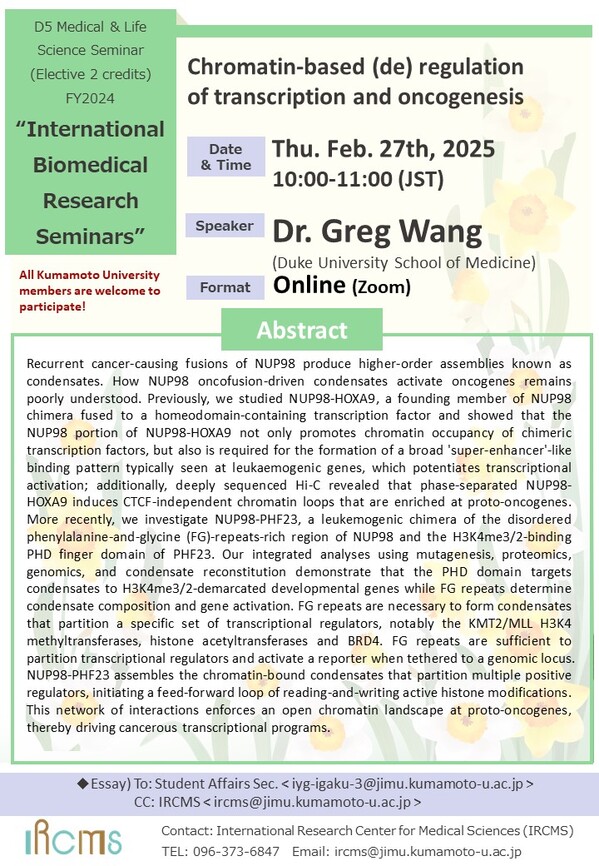- HOME
- News & Events
- [Feb. 27] D5 Seminar-Dr. Greg Wang (Duke University School of Medicine)
News & Events
[Feb. 27] D5 Seminar-Dr. Greg Wang (Duke University School of Medicine)
February 13 2025
The "D5 Medical & Life Science Seminar" course will be offered by International Research Center for Medical Sciences (IRCMS). It will run from May 2024 to March 2025, with lectures given by scientists who are affiliated with IRCMS or in collaboration with researchers at IRCMS. The lectures will be given once a month, in English, and by leading scientists in the relevant research field. Students will be taught: 1) how normal physiological functions are maintained in the human body; 2) how these systems become abnormal under certain pathophysiologic conditions; 3) why stem cells are important in animal development and homeostasis; 4) how stem cell-based approaches can help us understand disease mechanisms and find potential cure for diseases related to stem cell malfunction (e.g., cancer, aging).
Anyone who wants to join is welcome.
For students who have registered for the course, please check your attendance in Moodle.
Date : February 27, 2025 (Thursday)
Format : Online
Time : 10:00 - 11:00 (JST)
Speaker : Dr. Greg Wang (Duke University School of Medicine)
Title : Chromatin-based (de) regulation of transcription and oncogenesis
Abstract :
Recurrent cancer-causing fusions of NUP98 produce higher-order assemblies known as condensates. How NUP98 oncofusion-driven condensates activate oncogenes remains poorly understood. Previously, we studied NUP98-HOXA9, a founding member of NUP98 chimera fused to a homeodomain-containing transcription factor and showed that the NUP98 portion of NUP98-HOXA9 not only promotes chromatin occupancy of chimeric transcription factors, but also is required for the formation of a broad 'super-enhancer'-like binding pattern typically seen at leukaemogenic genes, which potentiates transcriptional activation; additionally, deeply sequenced Hi-C revealed that phase-separated NUP98-HOXA9 induces CTCF-independent chromatin loops that are enriched at proto-oncogenes. More recently, we investigate NUP98-PHF23, a leukemogenic chimera of the disordered phenylalanine-and-glycine (FG)-repeats-rich region of NUP98 and the H3K4me3/2-binding PHD finger domain of PHF23. Our integrated analyses using mutagenesis, proteomics, genomics, and condensate reconstitution demonstrate that the PHD domain targets condensates to H3K4me3/2-demarcated developmental genes while FG repeats determine condensate composition and gene activation. FG repeats are necessary to form condensates that partition a specific set of transcriptional regulators, notably the KMT2/MLL H3K4 methyltransferases, histone acetyltransferases and BRD4. FG repeats are sufficient to partition transcriptional regulators and activate a reporter when tethered to a genomic locus. NUP98-PHF23 assembles the chromatin-bound condensates that partition multiple positive regulators, initiating a feed-forward loop of reading-and-writing active histone modifications. This network of interactions enforces an open chromatin landscape at proto-oncogenes, thereby driving cancerous transcriptional programs.
2-3 Major Papers:
1. A
Ahn JH* Guo Y*, Lyons H*,..., Cai L#, Sabari B#, Wang GG#. The phenylalanine-and-glycine repeats of NUP98 oncofusion form condensates that selectively partition transcriptional coactivators. Molecular Cell (in press) 2025
Ahn JH, Davis ES, Daugird TA, Zhao S, Quiroga IY, Uryu H, Li J, Storey AJ, Tsai YH, Keeley DP, Mackintosh SG, Edmondson RD, Byrum SD, Cai L, Tackett AJ, Zheng D, Legant WR, Phanstiel DH#, Wang GG#. Phase separation drives aberrant chromatin looping and cancer development. Nature 2021 Jul;595(7868):591-595. Epub 2021 Jun 23. PMID: 34163069 PMCID: PMC8647409 DOI: 10.1038/s41586-021-03662-5.
2. A
Lu J*, Guo Y*, Yin J, Chen J, Wang Y, Wang GG#, Song J#. Structure-guided functional suppression of AML-associated DNMT3A hotspot mutations. Nat Commun. 2024 Apr 10;15(1):3111. doi: 10.1038/s41467-024-47398-y. PMID: 38600075
3. A
Zhao S*, Lu J*, Pan B, Fan H, Byrum SD, Xu C, Kim A, Guo Y, Kanchi KL, Gong W, Sun T, Storey AJ, Burkholder NT, Mackintosh SG, Kuhlers PC, Edmondson RD, Strahl BD, Diao Y, Tackett AJ, Raab JR, Cai L, Song J#, Wang GG#. TNRC18 engages H3K9me3 to mediate silencing of endogenous retrotransposons. Nature 2023 Nov;623(7987):633-642. PMID: 37938770 PMCID: PMC11000523
Flyer: (Click to enlarge)

